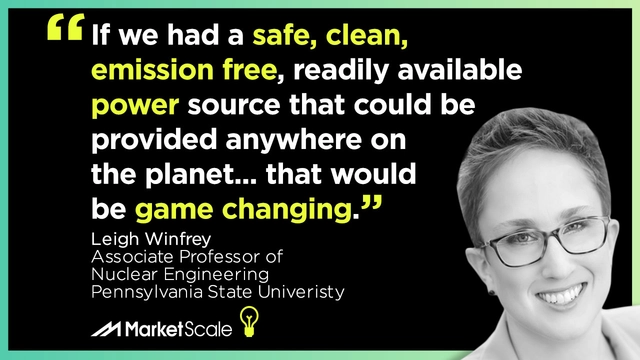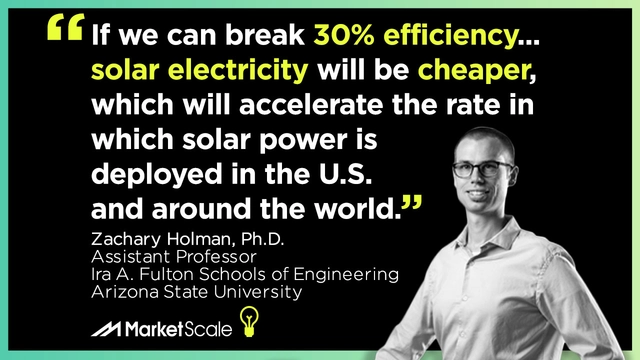MarketScale Energy 01/21/19: Breaking Solar Records & Setting Nuclear Standards
Energy is essential to life as we know it. The planet is facing some big challenges when it comes to energy and many scientists are working away on how to remedy this. In this podcast, we talk to two academia experts on what the future of energy may be.
The Dawn of Solar Panel Efficiency
Solar Energy is one of the most well-known forms of alternative clean power. However, most solar panels made with silicon only convert less than 30% of solar rays into energy. The drive to create greater efficiencies is underway. Joining us to discuss his work in solar efficiency is Dr. Zachary Holman, assistant professor at Arizona State University. Dr. Holman shares thoughts on current efficiency limits, how new tandems are being created to improve the efficiency limit, and how better solar panels will benefit our world.
Dr. Holman said of efficiency, “It matters because efficiency helps rein in costs for the average solar panel buyer. About 80% of the cost is related to balance of systems, which isn’t related to the panel itself. Costs for the panels have come down but not other fees so efficiency needs to be boosted to counteract the rising balance of systems costs.”
The problem is that the most common material—silicon—is at its limit of efficiency. So new panels called tandems are what will propel efficiency. Dr. Holman commented, “Right now silicon only converts one type of ray from the sun, but the sun has all wave lengths. The challenge now is finding new materials that can increase efficiency in combination with silicon that are cost-effective and stable.”
Listen to the entire conversation to find out how those tandems will work in the future.
Setting Nuclear Standards
 Fusion energy is a discipline that’s exploding right now. Fusion energy is the energy that powers the sun, but on Earth, it’s harder to create. That’s because, it requires two positives to be put together, which requires insanely high heat. While the actual fusion has occurred in lab settings, thus far, the reaction has not been able to continue to produce energy.
Fusion energy is a discipline that’s exploding right now. Fusion energy is the energy that powers the sun, but on Earth, it’s harder to create. That’s because, it requires two positives to be put together, which requires insanely high heat. While the actual fusion has occurred in lab settings, thus far, the reaction has not been able to continue to produce energy.
Today, Dr. Leigh Winfrey, Associate Professor of Nuclear Engineering at Pennsylvania State University, joins us to discuss the increased interest in fusion energy and how 2019 could be a turning point.
Dr. Winfrey shared the reasons for possible movement in 2019, “There have been lots of advances in the supporting technology for one. Also, there have been many start-ups focused on making fusion energy a reality. They are improving the current methods as well as trying new ones.”
So why should we care about fusion energy? Dr. Winfrey offered, “Fusion energy has many benefits when compared with nuclear fission or other power producers. Its clean and doesn’t create the same type of nuclear waste as fission. Plus, fusion energy delivers much more energy, and it can be placed in smaller spaces, allowing many access to almost limitless energy.”
Follow us on social media for the latest updates in B2B!
Twitter – @EnergyMKSL
Facebook – facebook.com/marketscale
LinkedIn – linkedin.com/company/marketscale










